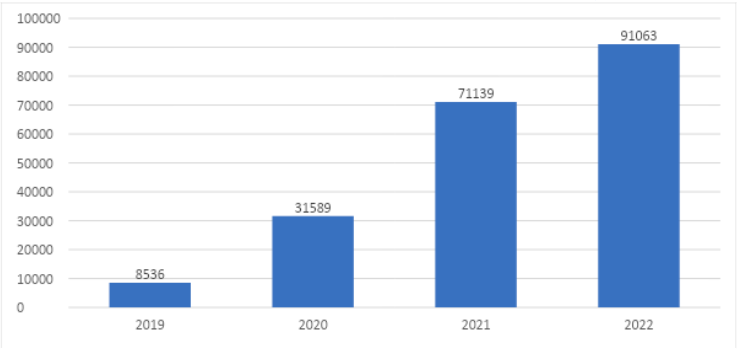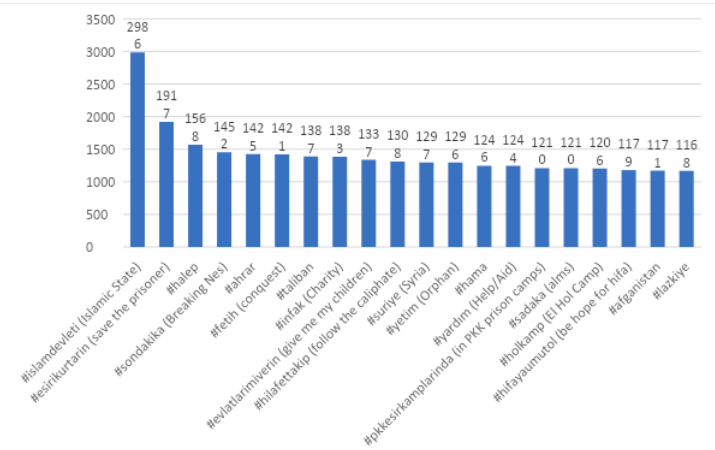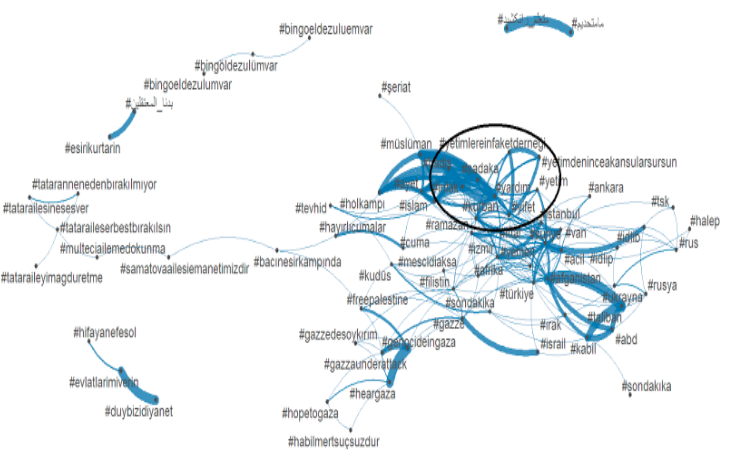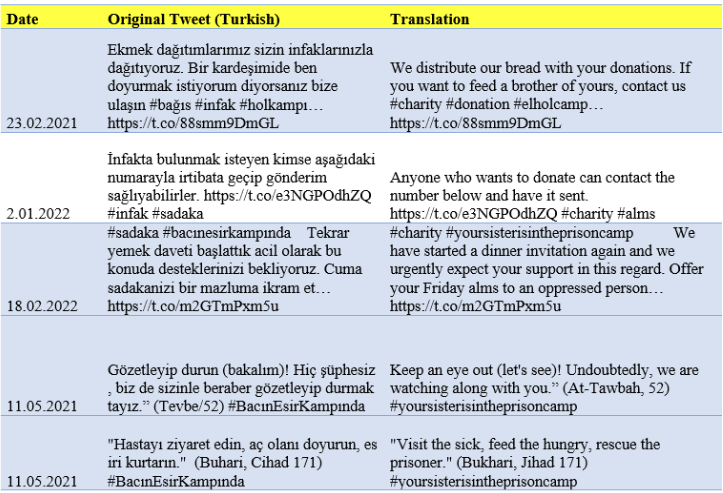Note 1: This Insight has been prepared as part of a project supported by the Scientific and Technological Research Council of Türkiye (TÜBITAK).
Note 2: In July 2023, Twitter was rebranded as X. Since this Insight covers the period between 2019 and 2022, the term “Twitter” is used throughout instead of “X.”
Introduction
In recent years, there have been significant and remarkable developments in social media platforms and technologies. Such advances include the personalisation of content, the use of advanced analytics and artificial intelligence to enhance user participation, and the integration of social media platforms with virtual reality and augmented reality technologies. With these advancements, social media platforms have become an integral part of people’s daily lives. However, social media has also impacted the reach of terrorist organisations, their members, and their supporters. One of the most prominent examples of this powerful connection is the proficient utilisation of Twitter (currently X) by the members and supporters of the Islamic State of Iraq and Syria (ISIS).
In this context, many studies in the terrorism literature focus on the Twitter activities of ISIS sympathisers. Similarly, numerous academic studies examine the Twitter activities of ISIS supporters following US President Donald Trump’s announcement in 2019 that US-backed forces had regained 100% of the territory previously held by ISIS in Syria and Iraq. However, there is a limited number of studies that concentrate on the Twitter activities of ISIS supporters after the defeat announced in 2019 in a country like Türkiye, which plays a significant role in the fight against ISIS and is located on the transit route of ISIS’ foreign fighters.
Considering this limitation, this Insight examines the hashtags used by ISIS’s Turkish supporters on Twitter between 2019 and 2022. The main purpose of analysing these hashtags is to provide information about the topics that Turkish supporters of ISIS focus on and to determine the relationships between these topics through hashtags.
Methodology
In this Insight, the hashtags used by Turkish sympathisers and supporters of ISIS in 202,327 tweets between 2019 and 2022 are examined. The main reason for focusing on the hashtags in this study is that they are often used to distinguish and spread different themes and topics on Twitter. Sometimes, hashtag campaigns are used to promote a concept or point of view. In this regard, ISIS supporters also run hashtag campaigns expressing their support for the group and its mission. For this reason, many ISIS sympathisers use hashtags in their tweets. Using “trending” hashtags, even if unrelated to their action, is another way to distribute misinformation on Twitter.
First, this Insight conducts basic descriptive analyses to provide information about the dataset, including the total number of tweets, the number of different users who tweeted, and the number of hashtags used in the tweets.
After completing these steps, the main analysis of this project began. First, the most used hashtags in tweets were identified. Following this, a hashtag network analysis and a quantitative approach were conducted to examine the potentially complex interaction network between hashtags used by ISIS’s Turkish supporters on Twitter. This analysis aims to demonstrate the relationships between hashtags in tweets and highlight critical structural features in the relational connections between hashtags.
The project was completed by randomly selecting tweets that contained some of the most commonly used hashtags. This was done to demonstrate the intended use of these hashtags, the topics they centre around, and the connections between them in a more detailed and meaningful manner.
Results
This study began by examining the distribution of 202,327 tweets by year. It was observed that the number of tweets increased gradually and consistently. In 2019, a total of 8,536 tweets were posted, making it the year with the fewest tweets in the dataset. The highest number of tweets was recorded in 2022, with 91,063 tweets posted that year.

Figure 1: Number of Tweet inside the Datase
In the following step, it was found that the tweets were posted by 666 different users. The user who tweeted the most has 7,037 tweets. Forty-seven users have over 1,000 tweets, and 367 of the users tweeted between 1 and 98 times.
In the final step of the descriptive analysis, the number of hashtags used in tweets was examined in relation to the Insight’s main focus. It was found that hashtags were used in 27,080 out of 202,327 tweets, which is 13.38% of all tweets.
After conducting a descriptive analysis, the most frequently used hashtags in tweets were identified initially. When the 20 most frequently used hashtags were examined, it was found that the most used hashtag was #islamicstate.

Figure 2: Most Frequently Used Hashtags
It was concluded that hashtags such as #savetheprisoner, #aleppo, #elholcamp, and #breakingnews are among the most frequently used hashtags. The most frequently used hashtags can be divided into three main groups.
- The first group includes hashtags related to ISIS and similar terrorist organisations. Examples of this group include #islamicstate, #ahrar, #caliphatefollowing, and #taliban.
- The second group includes hashtags related to ISIS supporters and their families who are detained under the control of the People’s Defense Units (YPG). This group includes hashtags such as #saveprisoners, #inpkkprisoncamps, and #elholcamp.
- The third group of hashtags is related to different types of aid, such as financial aid. This group includes hashtags such as #charity, #behopeforhifa, and #alms.
A hashtag network analysis was conducted to delve deeper into the hashtags used in tweets. This analysis provides crucial insights into the relationships among the hashtags used and their significance.

Figure 3: Hashtag Network Analysis Results
The hashtag network analysis findings are quite remarkable. The first of these findings concerns the relationships between hashtags. Upon examining these relationships, it is evident that there is one main hashtag group and four smaller, unconnected hashtag groups. In other words, the main group signifies a central topic or theme that is widely popular or relevant within the dataset. This group represents the predominant topics or trends that Turkish supporters of ISIS concentrate on. Smaller and independent hashtag groups reflect niche topics or less popular discussions that remain separate from the broader conversation.
Secondly, the most significant finding of the study pertains to the importance of hashtags in different types of aid, especially financial support. This crucial role is emphasised in the central cluster revealed by hashtag network analysis. Moreover, these hashtags show strong connections with hashtags such as #elholcamp (#holkampı).
To offer more comprehensive insights into the second significant finding, tweets containing hashtags associated with different types of aid were randomly chosen and examined. It was found that Turkish supporters of ISIS seek financial aid through Twitter. Furthermore, they interact with potential financial donors via Twitter, phone numbers, or Telegram. The analysis of hashtag networks also reveals the frequent use of hashtags such as #elholcamp and #yoursisterinprisoncamp, in addition to those related to financial support. Additionally, religious hadiths were used to rationalise the rescue efforts for families of ISIS members detained in YPG-controlled camps.

Figure 4: Randomly Selected Tweets
What do these findings mean?
Hashtags such as “#savetheprisoner,” “#inpkkprisoncamps,” and “#elholcamps” are the most popular hashtags in ISIS Turkish supporters’ tweets from 2019 to 2022. On 11 February 2022, twenty-two people were detained in Istanbul and Bursa for supporting ISIS financially. They were detained because they collected aid for ISIS members in El-Hol and Roj camps, where ISIS members were held, via Twitter. It is found that these people frequently operate under the “#rescuetheprisoners” hashtag. In addition, on 20 January 2022, ISIS terrorists attacked the Sinai prison in Hasakah, Northern Syria, where ISIS members were held. Gunfights continued for a week to control the prison; during that time, Turkish sympathisers of ISIS predominantly used the “#savetheprisoner” and “inpkkprisoncamps” hashtags in their tweets.
In addition, “#breakingnews” is among the most frequently used hashtags. The academic literature indicates that ISIS supporters in Türkiye use hashtags such as “#breakingnews” on Twitter to attract attention and reach more people.
Hashtag network analysis reveals that not all of the hashtags used by Turkish supporters of ISIS are interconnected. In other words, this result shows that the hashtags used by ISIS’s Turkish supporters do not form a complete unity; instead, they demonstrate a diverse range of hashtags related to various topics. “#Thereispersecutioninbilgöl (#bingöldezulümvar)” hashtag, one of the four small unconnected hashtag groups reached as a consequence of the hashtag network analysis, supports this argument. In 2021, the police launched an operation against the Bingöl branch of “Tawhid magazine,” a Salafist group whose members were arrested for supporting organisations such as ISIS and Al-Qaeda. After the group members resisted the security force, the police detained some group members. As a result of these detentions, the group members started the “#thereispersecutioninbingöl” hashtag on Twitter. “Tawhid Magazine” promotes Salafist ideas similar to ISIS, and while some members joined ISIS, the group does not fully support ISIS. However, many group members also express support for ISIS on Twitter.
The project’s most significant finding is that hashtags related to financial aid have become central to the hashtags used inside tweets. In addition, it is understood that ISIS Turkish supporters contact those who want to provide financial aid either via Twitter, Telegram or by phone number, especially – and perhaps obviously – under the hashtags used for financial aid. In other words, finances supporting ISIS are collected through unofficial and unregistered methods, not through banks in an officially recorded manner, and are delivered to individuals by hand.
Finally, it is observed that these hashtags, encompassing financial aid, are commonly paired with hashtags like #yoursisterinprisoncamp and #elholcamp, which are under YPG control and are primarily associated with the camps where the families of ISIS members are held. Moreover, religious hadiths and verses from the Qur’an seem to be used to justify the rescue of the families of ISIS members detained in YPG-controlled camps.
Conclusion
The important findings of this Insight can be grouped into four main categories.
- The first significant discovery from the hashtag network analysis is the central role of hashtags related to financial aid during the study period.
- The second key finding is the strong relationship between hashtags promoting different types of aid, such as financial assistance, and hashtags supporting the families of ISIS members held in camps under YPG control.
- The third observation is that financial aid starts on Twitter and then continues, sometimes offline and sometimes on encrypted platforms such as Telegram, to avoid detection by authorities. Moreover, tweets indicate that the collected aid is handed out to recipients in person.
- The final finding highlights the endorsement and justification of rescuing ISIS members and their families detained in YPG-controlled camps through religious hadiths and verses.
In summary, the results indicate that the Twitter activities of ISIS’s Turkish supporters continued to increase between 2019 and 2022. Financial support was collected on behalf of ISIS through these activities, and attempts were made to legitimise the rescue of families of ISIS members detained in camps under YPG control. These findings suggest that the activities of ISIS supporters enable them to sustain their activities not only in Türkiye but also in other countries in the region, posing significant challenges. Addressing this issue necessitates multifaceted approaches that involve close communication among tech companies, security forces, and the media.
Accordingly, tech companies should use advanced artificial intelligence algorithms along with human moderators to detect and remove accounts, specific hashtags, and posts that support or fundraise for ISIS and report these activities to law enforcement. However, collaboration between tech companies and security forces alone is insufficient to solve the problem. Furthermore, cooperation should be established with the media to raise awareness about the misuse of social media for terrorist purposes. Individuals should be educated about the activities of supporters of terrorist organisations and motivated to report such activities to the authorities.
The Insight was prepared within the scope of the project titled “Comparative Analysis and Explanation of the Fear of Terrorism in Taiwan and Turkey” and is funded by The Scientific and Technological Research Council of Türkiye (TÜBITAK).
Dr. Ahmet Yiğitalp Tulga is a Postdoctoral Researcher Department of Diplomacy at National Chengchi University, Taiwan (R.O.C.). He earned his PhD at National Sun Yat-sen University, Taiwan (R.O.C) and his MA at Ankara University, Türkiye. He has written and published several articles and book chapters in Turkish and English. His research primarily focuses on public opinion, Southeast Asia, the role of ISIS’ online propaganda, social media- terrorism relations, social media strategies of terrorist organisations and the effects of these strategies on people.
